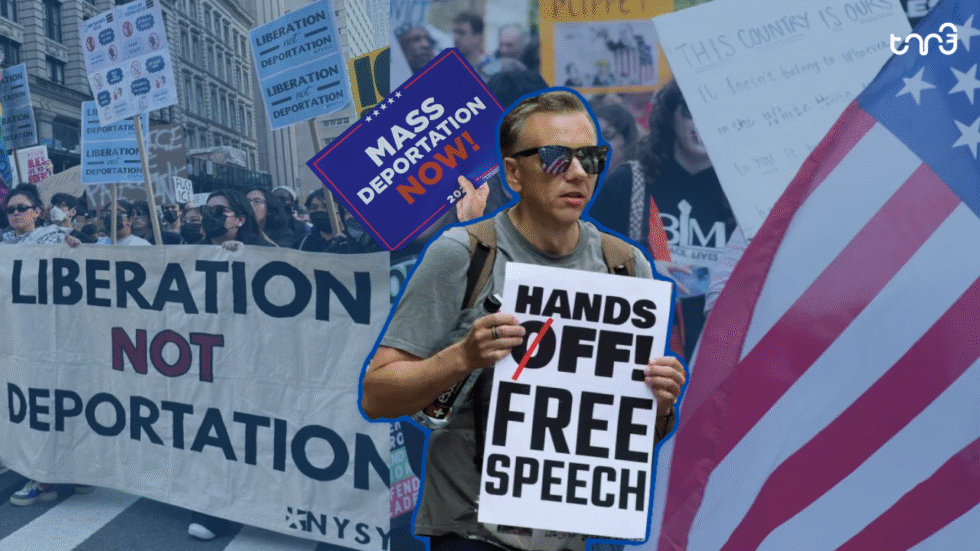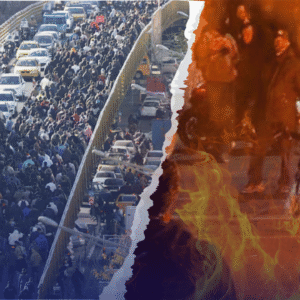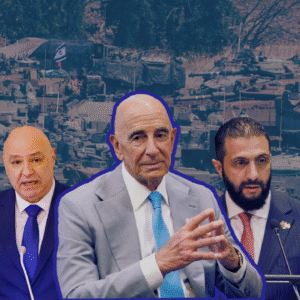Deported for Dissent: How the U.S. Weaponizes Detention & Deportation Policies

Under the guise of national security and immigration control, the United States has long used detention and deportation not just as tools of border enforcement, but as instruments of political coercion.
In recent years, this strategy has expanded to include the targeting of foreign nationals based on their countries’ political ties—or their personal political beliefs.
From Russian nationals after the 2022 invasion of Ukraine to Iranians deported or denied entry for speaking out against Israel’s actions in Gaza, the U.S. increasingly treats political dissent as a deportable offense. However, it is significant to note that many of these deportations and detentions occur even against people with no convictions, history of activism, or dissent.
Recent cases involving Iraqi, Lebanese, Iranian, and Russian nationals expose a pattern where legal status and lack of criminal activity offer no shield from expulsion—often under the guise of security or administrative expediency.
ICE – The Legacy of 9/11
The United States Immigration and Customs Enforcement agency was formed a year after the 9/11 terrorist attacks, from the Homeland Security Act of 2002. The previous Immigration and Naturalization Service and United States Customs Service were absorbed under this new agency, with all functions, services, and roles now assumed by ICE.
ICE has two main branches, the Enforcement and Removal Operations branch (ERO) and Homeland Security Investigations (HSI). The former focuses on locating, detaining, and deporting undocumented immigrants or noncitizens accused of violating immigration laws.
This includes carrying out arrests, managing immigration detention centers, and facilitating deportations. The latter targets broader criminal activity such as human trafficking, drug smuggling, cybercrime, and violations of customs or trade laws.
By mid-August, ICE had received over 100,000 applications for positions in the agency. This comes after it was reported that ICE issued over a thousand job offers since July 4th. The offers come with enticing incentives for people, ranging from up to $50,000 as a sign-on bonus, $60,000 in student loan forgiveness, and a relaxation on eligibility requirements, such as age limitations. The incentives and job offers seem to be a move by the administration to bolster ICE’s manpower.
Lebanese Nationals
In March 2025, Dr. Rasha Alawieh, a Lebanese transplant nephrologist employed at Brown University on a valid H‑1B visa, was deported from Boston Logan Airport—despite an injunction from U.S. District Judge Leo Sorokin, who ordered that she not be removed without 48 hours’ notice and a hearing. The government justified her removal by citing that her phone contained “sympathetic photos and videos” of Hezbollah leader Hassan Nasrallah and others.
A Department of Homeland Security spokesperson stated: “A visa is a privilege, not a right. Glorifying and supporting terrorists who kill Americans is grounds for visa issuance to be denied.”
Pro-Palestine Activism
Cases like Mahmoud Khalil, a Columbia student and legal resident, of Palestinian background, arrested and targeted for anti-Israel speech, and Badar Khan Suri, a Georgetown researcher detained for perceived pro-Palestine sentiments, illustrate how dissent—particularly criticism of U.S. allies—can trigger immigration enforcement.
Both Khalil and Suri were detained not for unlawful acts, but for speech protected under the First Amendment. DHS invoked broad “national security” powers, citing their speech as grounds for removal under rarely used foreign policy clauses. Neither individual faced criminal charges, yet both were placed in detention, sparking widespread condemnation from civil rights groups.
These detentions reflect an increasingly visible pattern: political speech critical of U.S. foreign allies—especially Israel—faces disproportionate scrutiny, further suggesting immigration enforcement is being weaponized to suppress protected expression under the guise of national security.
According to tracking by The Guardian, over 600 international students and recent graduates had visas revoked in early 2025, many tied to pro‑Palestinian protests or trivial infractions. The Marshall Project reported at least 300 such revocations were linked to activism. Broad data compiled by activist tracking sources suggest that by mid‑May, nearly 2,000 student visa revocations had taken place, though many were later reversed through court actions.
Iraqi Refugees
In April 2025, Omar Abdulsattar Ameen, an Iraqi refugee admitted to the U.S. in 2014, was deported to Rwanda, even though a U.S. magistrate judge in 2021 found the allegations against him “not plausible” and ruled strongly in his favor.
Human Rights Watch previously denounced his treatment, citing “a system of arbitrary detention and cruel enforcement”. A leaked cable suggested that Rwanda’s acceptance of Ameen marked a test-case for broader “third-country deportation” arrangements.
Rwanda notoriously became the center of debate when the United Kingdom signed an agreement with the East African country in 2022, arranging to move migrants in the UK to Rwanda for processing. Earlier this month, it was revealed that the U.S. and Rwanda had come to an agreement of a similar nature, in which Rwanda would receive up to 250 deportees.
Iranians and Russians
Following the October 2023 escalation in Gaza, multiple Iranian nationals residing in or traveling to the U.S. have reported being detained, interrogated, and even deported for comments made online condemning Israeli military actions.
In at least three known cases since April 2024, Iranian students at American universities have been denied reentry after attending pro-Palestine rallies or posting support for Gazan civilians on social media.
In 2025, Iranian nationals—including asylum seekers, long-term residents, and a PhD student—have been detained or deported under vague “national security” concerns, often without criminal charges. In one week in early July, a reported 130 Iranian nationals were arrested by ICE, bringing the number up to some near 700 Iranians detained.
On March 25, 2025, ICE detained Alireza Doroudi, an Iranian doctoral student on an F‑1 visa at University of Alabama. DHS accused him of posing a “national security concern,” though no criminal charges or protest participation were documented. After 41 days in detention, Doroudi opted to return home rather than continue proceedings, despite assurances from his lawyer that he had a strong legal position.
Another documented case involves Mohammad Shahab Dehghani Hossein Abadi, a graduate student at Northeastern University, who was denied entry to the U.S. despite holding a valid F‑1 visa. Officials cited concerns over his immediate family’s alleged business connections to an IRGC-sanctioned transport company implicated in providing support to Hezbollah, even though Abadi himself had no recorded activism or criminal activity. His sudden deportation—in defiance of a federal judge’s temporary stay—drew criticism from Northeastern University, the ACLU, and other civil rights advocates.
Russian researchers and asylum seekers, such as Harvard PhD student Kseniia Petrova, who was returning from a trip to Paris, protesting the Ukraine war, have faced detentions, visa revocations, and expedited removals. In Petrova’s case, ICE detained her on the grounds of failing to declare a sample of frog embryos as a favor for a fellow researcher from a colleague in Paris.
Arbitrary Detentions
Although ICE often frames its operations around criminal enforcement and national security, numerous reports and legal cases show that the agency frequently targets individuals with no criminal record and no political activism.
Many immigrants—students, professionals, and long-term residents—have been detained or deported over minor visa infractions, paperwork delays, or vague “security concerns,” without any formal charges or history of dissent. This has fueled criticism that ICE’s enforcement increasingly reflects bureaucratic punishment or political optics rather than public safety priorities.
Northern California notably has seen a surge in ICE arrests of people without criminal backgrounds or convictions. In July, 56% of those arrested had no priors, compared to 10% in December of last year, just before the current administration came to power.
Silencing Through Expulsion
The United States has long claimed to champion freedom of speech and human rights. Yet, in 2025, an unsettling pattern is unfolding—where detention and deportation are increasingly used not merely as immigration enforcement tools but as mechanisms of political control.
Whether it’s a Lebanese doctor with a valid visa, an Iraqi refugee once cleared by U.S. courts, or Iranian students quietly supporting Palestinian rights, the message is clear: dissent—especially when it challenges U.S. foreign policy—comes at a cost.
The Biden and Trump administrations alike have leaned into a framework that blurs the line between national security and ideological policing, often targeting individuals with no criminal records, no due process, and no clear justification beyond perceived associations or beliefs.
From deportations to third countries like Rwanda and Eswatini to the silencing of lawful residents based on social media activity or protest attendance, these actions set a dangerous precedent for the erosion of civil liberties, not just for foreign nationals—but for the nation itself.
In an era where democracy is tested not only by elections but by how a state treats its most vulnerable, the United States risks becoming the very thing it so often claims to oppose: a system where silence is safe, and speech is punishable by exile.
If you value our journalism…
TMJ News is committed to remaining an independent, reader-funded news platform. A small donation from our valuable readers like you keeps us running so that we can keep our reporting open to all! We’ve launched a fundraising campaign to raise the $10,000 we need to meet our publishing costs this year, and it’d mean the world to us if you’d make a monthly or one-time donation to help. If you value what we publish and agree that our world needs alternative voices like ours in the media, please give what you can today.














